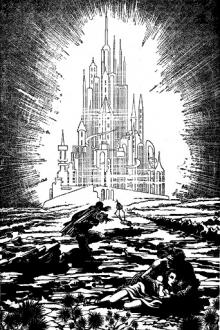Short Fiction - Philip K. Dick (100 books to read in a lifetime TXT) 📗

- Author: Philip K. Dick
Book online «Short Fiction - Philip K. Dick (100 books to read in a lifetime TXT) 📗». Author Philip K. Dick
The day was drizzly and overcast. Business had been bad. An automobile had scared his two horses. On bad days less people were outside and he had to get down from the cart and go to ring doorbells.
But the man in the yellow house had given him a dollar for fixing his electric refrigerator. Nobody else had been able to fix it, not even the factory man. The dollar would go a long way. A dollar was a lot.
He knew it was a tornado even before it hit him. Everything was silent. He was bent over his whetstone, the reins between his knees, absorbed in his work.
He had done a good job on the knife; he was almost finished. He spat on the blade and was holding it up to see—and then the tornado came.
All at once it was there, completely around him. Nothing but grayness. He and the cart and horses seemed to be in a calm spot in the center of the tornado. They were moving in a great silence, gray mist everywhere.
And while he was wondering what to do, and how to get the lady’s knife back to her, all at once there was a bump and the tornado tipped him over, sprawled out on the ground. The horses screamed in fear, struggling to pick themselves up. Cole got quickly to his feet.
Where was he?
The grayness was gone. White walls stuck up on all sides. A deep light gleamed down, not daylight but something like it. The team was pulling the cart on its side, dragging it along, tools and equipment falling out. Cole righted the cart, leaping up onto the seat.
And for the first time saw the people.
Men, with astonished white faces, in some sort of uniforms. Shouts, noise and confusion. And a feeling of danger!
Cole headed the team toward the door. Hoofs thundered steel against steel as they pounded through the doorway, scattering the astonished men in all directions. He was out in a wide hall. A building, like a hospital.
The hall divided. More men were coming, spilling from all sides.
Shouting and milling in excitement, like white ants. Something cut past him, a beam of dark violet. It seared off a corner of the cart, leaving the wood smoking.
Cole felt fear. He kicked at the terrified horses. They reached a big door, crashing wildly against it. The door gave—and they were outside, bright sunlight blinking down on them. For a sickening second the cart tilted, almost turning over. Then the horses gained speed, racing across an open field, toward a distant line of green, Cole holding tightly to the reins.
Behind him the little white-faced men had come out and were standing in a group, gesturing frantically. He could hear their faint shrill shouts.
But he had got away. He was safe. He slowed the horses down and began to breathe again.
The woods were artificial. Some kind of park. But the park was wild and overgrown. A dense jungle of twisted plants. Everything growing in confusion.
The park was empty. No one was there. By the position of the sun he could tell it was either early morning or late afternoon. The smell of the flowers and grass, the dampness of the leaves, indicated morning. It had been late afternoon when the tornado had picked him up. And the sky had been overcast and cloudy.
Cole considered. Clearly, he had been carried a long way. The hospital, the men with white faces, the odd lighting, the accented words he had caught—everything indicated he was no longer in Nebraska—maybe not even in the United States.
Some of his tools had fallen out and gotten lost along the way. Cole collected everything that remained, sorting them, running his fingers over each tool with affection. Some of the little chisels and wood gouges were gone. The bit box had opened, and most of the smaller bits had been lost. He gathered up those that remained and replaced them tenderly in the box. He took a keyhole saw down, and with an oil rag wiped it carefully and replaced it.
Above the cart the sun rose slowly in the sky. Cole peered up, his horny hand over his eyes. A big man, stoop-shouldered, his chin gray and stubbled. His clothes wrinkled and dirty. But his eyes were clear, a pale blue, and his hands were finely made.
He could not stay in the park. They had seen him ride that way; they would be looking for him.
Far above something shot rapidly across the sky. A tiny black dot moving with incredible haste. A second dot followed. The two dots were gone almost before he saw them. They were utterly silent.
Cole frowned, perturbed. The dots made him uneasy. He would have to keep moving—and looking for food. His stomach was already beginning to rumble and groan.
Work. There was plenty he could do: gardening, sharpening, grinding, repair work on machines and clocks, fixing all kinds of household things. Even painting and odd jobs and carpentry and chores.
He could do anything. Anything people wanted done. For a meal and pocket money.
Thomas Cole urged the team into life, moving forward. He sat hunched over in the seat, watching intently, as the Fixit cart rolled slowly across the tangled grass, through the jungle of trees and flowers.
Reinhart hurried, racing his cruiser at top speed, followed by a second ship, a military escort. The ground sped by below him, a blur of gray and green.
The remains of New York lay spread out, a twisted, blunted ruin overgrown with weeds and grass. The great atomic wars of the twentieth century had turned virtually the whole seaboard area into an endless waste of slag.
Slag and weeds below him. And then the sudden tangle that had been Central Park.
Histo-research came into





Comments (0)